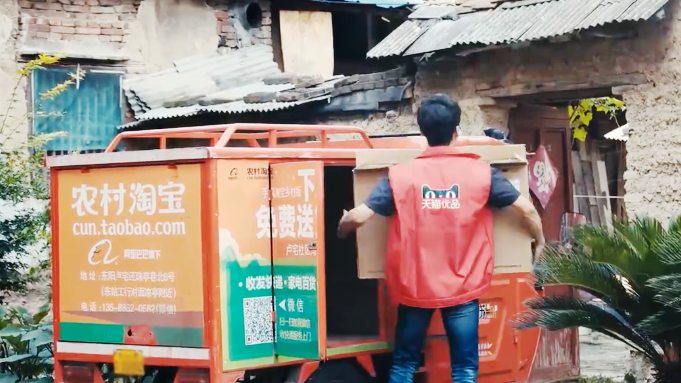
Alibaba Group’s rural initiative—Rural Taobao—plans to expand its coverage to 1,000 counties and 150,000 villages across China in the next three years, the company said Thursday.
Launched in October 2014, Rural Taobao is one of Alibaba’s three main strategic projects in addition to globalization and cloud computing. It aims to buttress trade between China’s remote regions and urban areas. Presently, around half of China’s 1.3 billion reside in rural areas.
“Our mission is clear: We want to improve the living conditions of China’s rural regions. To do so, we need to provide high-quality goods, personalized services, smart logistic solutions and prices comparable to that of the cities,” said Bill Wang, vice president of Alibaba Group and general manager of Rural Taobao.
As part of the project, a network of e-commerce service centers has been created at the county and town level to provide services that enable villagers to purchase products online, as well as sell their goods via Rural Taobao’s dedicated online marketplace and other Alibaba e-commerce platforms. This way, villagers can enjoy a wider range of products and promote their own products beyond the village borders.
Currently, the initiative covers 700 counties with over 30,000 service centers.
Speaking at 2018 Rural Taobao Merchant Summit at Alibaba’s Hangzhou headquarters, Alibaba executives emphasized the consumption power of China’s rural population, though weaker than in urban centers, is gradually becoming a force to be reckoned with.
According to the latest report from National Bureau of Statistics, in 2017, the average disposable income per capita in China’s rural region increased by 8.6% on-year to RMB 13,432 ($2,066). Consumption per capita also climbed 8.1% year-on-year to RMB 10,955.
The amount of online retail shopping in rural areas is also booming. In 2017, sales reached RMB 1.24 trillion ($194 billion), representing an on-year surge of 39%, said the Ministry of Commerce.
One of the short-term goals is to offer next-day delivery of any goods and at-home installation of large electronic products, Wang added. Alibaba has also recently opened a number of “Taobao Select Service Stations,” where villagers can purchase an array of products, from food, to clothes and electronic items, at a physical location, without having to place the orders online.
An integral part of the initiative is empowerment of the merchants, said Wang. By sharing insightful analytics about customer preferences and market trends with the brands, companies can develop products or craft marketing campaigns that are more befitting rural consumers.
For example, Germany-based skincare and personal hygiene giant Beiersdorf Group recently dispatched a team of researchers on a three-month fact-finding trip in China’s villages to learn about their hair-washing habits. From the information they’ve gathered, the parent company of iconic brands such as Nivea and Eucerin is able to design a shampoo that best meets the local needs and demands.
“Even though rural regions constitute a small portion of our total revenue, we treat it as an important market, not merely a sale channel,” said John Zhang, the general manager of Beiersdorf China, who has personally visited over 50 villages in the country.
In cooperation with brands, Rural Taobao also conducts frequent training sessions for service station managers to equip them with the necessary know-how and skill to deliver the best service to their customers, said Wang.
As part of the all-day summit, the 650-plus attendees were divided into different breakout groups in the afternoon to discuss the most pressing challenges and solutions facing their respective industries.




